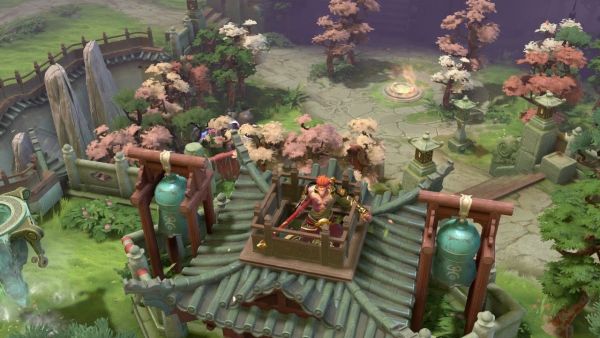The professional Dota 2 circuit is no stranger to drama, but the recent announcement regarding Gaimin Gladiators` withdrawal from The International 14 (TI14) has sent ripples through the community. What initially appeared as a unilateral decision by the organization quickly escalated into a public dispute, revealing the intricate and often volatile intersection of player aspirations and corporate realities in esports.
The Player`s Perspective: A Sudden Halt
The saga began with a public statement from Quinn Callahan, widely known as “Quinn,” the mid-player for Gaimin Gladiators. His claim was direct and unequivocal: the organization had, without prior mutual agreement, decided to pull the team from TI14. This assertion suggested a conflict where the players were ready and willing to compete under the Gladiators` banner, only to be denied the opportunity by their own management.
For any professional Dota 2 player, The International is the pinnacle event – the ultimate test of skill, teamwork, and mental fortitude, with life-changing prize pools at stake. To be told that the path to this dream tournament is blocked, especially when seemingly ready, understandably sparked frustration and confusion within the roster and among fans alike.
The Organization`s Counter-Narrative: Contracts and Complications
In response to Quinn`s post, Nick Kukovillo, CEO of Gaimin Gladiators, offered a vastly different account, painting a picture of complex contractual negotiations and logistical hurdles. Kukovillo`s statement clarified that while the team was indeed withdrawn, the impetus for this decision stemmed directly from the players themselves.
“We did indeed withdraw the team from TI, but the basis for this decision was the team`s request to nullify their contracts with Gladiators so they could compete at the tournament as independent players. We agreed and notified Valve that we would be unable to field a team for TI due to substitution rules.”
This revelation shifts the narrative dramatically. According to the CEO, the players initially sought freedom from their existing contracts, presumably to explore options as a self-managed entity for TI14. This request, if granted, would naturally mean that Gaimin Gladiators could no longer field a team under its own tag, adhering to Valve`s stringent rules regarding roster stability and substitutions for The International.
The Unforeseen Delay and Uncertainty
Kukovillo further elaborated on the breakdown in communication and decision-making that followed the players` initial request. He stated that the team failed to engage in timely negotiations to finalize the settlement terms for their contract nullification. By the time the players reportedly decided they *did* want to participate under the Gaimin Gladiators tag after all, the organization found itself in an untenable position.
“By the time they decided to participate in TI, we had no confidence that the team or its members would remain with GG or be able to represent the team and their colleagues at the tournament,” Kukovillo explained. “Simply put, the request from the team accelerated this decision, and their delay in decision-making and unpreparedness to successfully achieve their desired outcome at TI forced us to do so.”
This indicates a situation where a critical window for action was missed. In the fast-paced world of esports, where tournament slots and roster deadlines are unforgiving, such delays can be fatal. The organization, facing uncertainty about its roster`s commitment and the logistical nightmare of fielding a team that might not officially represent them, made the difficult choice to withdraw.
The Legal Veil: What Lies Beneath?
Both Quinn and Nick Kukovillo have alluded to “legal complexities” preventing them from disclosing the full details of the conflict. This is a common refrain in high-stakes professional sports, and esports is no exception. Contractual agreements, non-disclosure clauses, and ongoing negotiations often mean that the public only gets a glimpse of the truth, filtered through official statements and careful wording.
The precise sequence of events – who said what, when, and under what conditions – remains, much like a crucial Roshan fight in Dota 2, shrouded in a fog of war. The legal implications for both players and the organization are significant, touching upon contract breaches, potential damages, and the future viability of the team`s roster.
Implications for the Dota 2 Ecosystem
The Gaimin Gladiators` withdrawal from TI14 is more than just a footnote in tournament history; it`s a stark reminder of the underlying business complexities in competitive gaming. This incident highlights several key issues:
- Contractual Clarity: The importance of robust and mutually understood player contracts is paramount.
- Communication: The need for clear, timely, and effective communication between players and management to prevent misunderstandings and missed opportunities.
- Player Agency vs. Organizational Stability: The ongoing tension between players` desires for independence and organizations` needs for stable, committed rosters.
- Valve`s Role: The impact of tournament organizer rules on team roster management and participation.
For Gaimin Gladiators, a team that has achieved significant success in recent years, this withdrawal represents a major setback. For the players involved, it means a missed opportunity to compete at the most prestigious event of the year. For the wider Dota 2 community, it`s a cautionary tale about the unseen battles fought off-stage, where paperwork and legal technicalities can be just as formidable as any in-game opponent.
Moving Forward: An Uncertain Future
As the dust settles, the future of the Gaimin Gladiators` Dota 2 roster remains uncertain. Will the players eventually secure their independence? Will the organization rebuild? Only time, and perhaps further official statements unburdened by legal constraints, will reveal the full story. For now, the esports world is left to ponder the costly consequences when a “glitch” derails even the grandest of plans.

